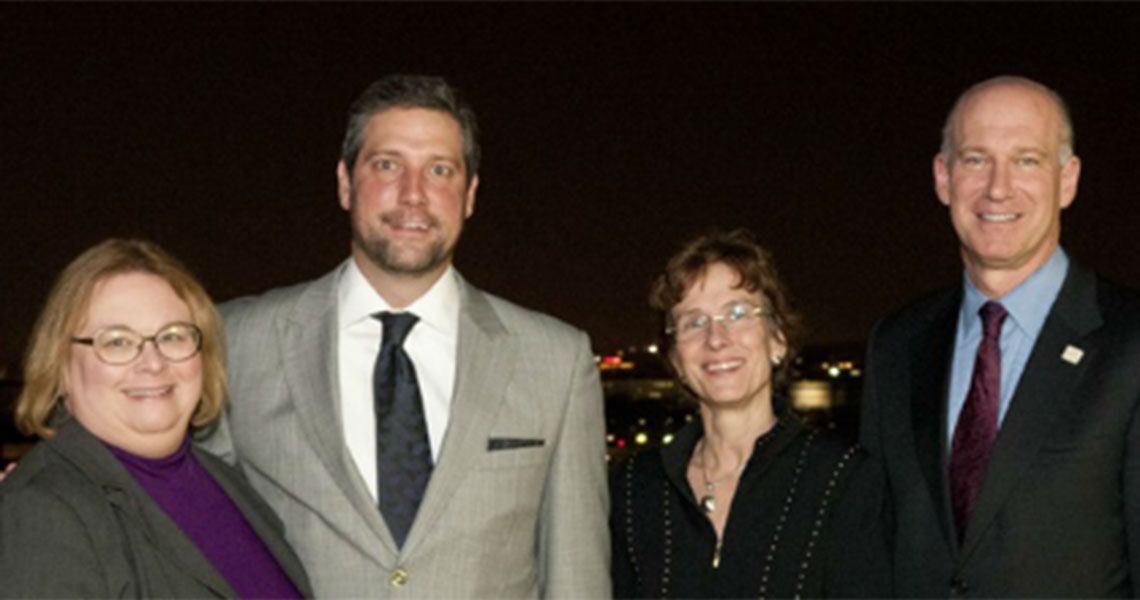Administering a dose of compassion and consideration can go a long way toward healing the human spirit, as well as the body. In an effort to create compassionate health care systems driven by dignity-based, person-centered care, The George Washington University Institute for Spirituality and Health (GWish) hosted the first National Consensus Conference on Creating Compassionate Healthcare Systems, Nov. 28-30. Founded in 2001, GWish is dedicated to developing a more compassionate and integrated system of care through research, education, and policy work that addresses the spiritual needs of patients. Experts from all facets of the healthcare arena gathered to offer their insight and input on ways to develop compassionate systems of care. Christina M. Puchalski,M.D. '94, RESD '97, professor of medicine at the George Washington University School of Medicine and Health Sciences (SMHS) and founder and director of GWish, opened the conference by encouraging attendees to think critically about how to integrate not just the physical aspects of care, but the inner aspects of care such as mindfulness, meditation, and spiritually.
Being mindful and mediating is a part of everyday life for keynote speaker Representative Tim Ryan’s, D-OH17. Referencing his new book, “A Mindful Nation: How a Simple Practice Can Help Us Reduce Stress, Improve Performance, and Recapture the American Spirit,” Ryan discussed the importance of mindful mediation and its role in his political career. “I began my political career at age 29. I was constantly campaigning, traveling, and taking on more and more responsibility in Congress. By age 35, I knew I if continued at this pace I would be burnt out by age 40,” said Ryan. The Congressman turned to mediation and discovered an overall sense of well-being. “I was more focused, could concentrate better, and I was a nicer person when I mediated,” said Ryan.
Outlining the conference objectives, Puchalski pointed out that quality health care is really about relationships and that compassion should be the foundation of that relationship. “We need to put some value on service, on compassionate relationships, on the care of the caregiver, and on spiritually as an essential part of who people are,” said Puchalski. Looking at spiritually as a way to heal our health care system and as the root of being able to deliver compassionate care, Puchalski explained that it’s really about caring in every sense of the word. “Compassionate care is patient-centered. It’s about the value and importance of the relationship between the patient and the physician,” she said. “It also brings in the concept of healing whether a cure is possible or not.”
Building on Rep. Ryan’s remarks on mindful meditation and compassionate care, attendees were broken up into small groups to define the core characteristics of compassionate care and develop a standard of care to create compassionate health care systems. During the discussion, Cathy DeAngelis, M.D., M.P.H., professor of pediatrics at Johns Hopkins University School of Medicine and Public Health, concluded that compassionate care is all about the clinician or physician putting themselves into the situation and understanding what the patient is feeling and going through at that time. “The key is to always leave the patient with hope and let them know that they are not alone,” said DeAngelis.
Later, DeAngelis led a role playing exercise along with conference moderator Sharon K. Hull, M.D., M.P.H., professor in the department of family and community medicine at Northeast Ohio Medical University. Void of compassion and eye contact DeAngelis, playing the role of physician, delivered a devastating diagnosis of breast cancer. “She made me feel like I wasn’t in the room, except for a piece of paper,” said Nancy Reller, president of Sojourn Communications, who played the patient. In the second scenario, Puchalski painted a more charitable picture of a physician, breaking the news with compassion and consideration by making the patient feel comfortable and more at ease through eye contact and greeting her with a hug.
Focusing on next steps, most importantly how to turn the conversation and ideas and into measureable actions, participants were asked to propose standards of care. These practices were later voted on and ranked based on their level of importance. These standards fueled the development of action items in six areas including clinical care, community outreach, education, research, policy, advocacy, and communications. The experience was so compelling, several conference attendees volunteered to serve on a national coalition to carry the conference initiatives forward. Pointing out that health care is at a pivotal junction, one participant suggested that now is the time to include compassion and spirituality in the larger conversation with policymakers, educators, and community leaders.
Puchalski’s work and creation of this conference will have a greater impact than just on health and medical education. “Christina’s work has effected and impacted the curricular of almost all the health professions,” said Jean Johnson, Ph.D., dean of the school of nursing at GW.
This conference is the first step in a long process to one day implement guidelines for standards of compassionate care. For Puchalski, creating compassionate care healthcare systems is all about treating patients with empathy and consideration. “Even when a cure is not possible, healing is possible,” said Puchalski.



